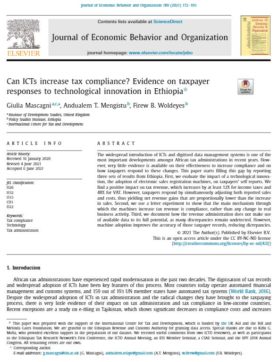Journal of Economic Behavior and Organization Volume 189
The widespread introduction of ICTs and digitised data management systems is one of the most important developments amongst African tax administrations in recent years. However, very little evidence is available on their effectiveness to increase compliance and on how taxpayers respond to these changes.
This paper starts filling this gap by reporting three sets of results from Ethiopia. First, we evaluate the impact of a technological innovation, the adoption of electronic sales registration machines, on taxpayers’ self reports. We find a positive impact on tax revenue, which increases by at least 12% for income taxes and 48% for VAT.
However, taxpayers respond by simultaneously adjusting both reported sales and costs, thus yielding net revenue gains that are proportionally lower than the increase in sales. Second, we use a letter experiment to show that the main mechanism through which the machines increase tax revenue is compliance, rather than any change in real business activity. Third, we document how the revenue administration does not make use of available data to its full potential, as many discrepancies remain undetected.
However, machine adoption improves the accuracy of those taxpayer records, reducing discrepancies.

